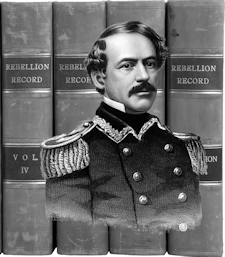21st. First Battalion moved on horseback for St. Charles at nine A. M. Wrote to Uncle Albert.
Saturday, January 21, 2012
Tuesday Jan’y 21st 1862
Weather continues soft and unpleasant, a light rain nearly all day. Battle in Kentucky and death of Zollicoffer confirmed. “Sesesh” must now take a succession of hard Knocks. Our troops are now disciplined and more in Earnest. In the office a[s] usual. Went down to the National this evening, spent an hour or two in Mr Shorts room. Saw his partner in the “fire Bomb,” Lyman B Smith, Mr Jewett the Engraver of Buffalo, Maj Chapin from over the River, the “Ellsworth” Regt. I came home about 10 o’clock. The Maj thinks there is to be an advance soon. People are waiting for it with a great deal of impatience. Our armies are in good condition and eager for a “fight” everywhere.
______
The three diary manuscript volumes, Washington during the Civil War: The Diary of Horatio Nelson Taft, 1861-1865, are available online at The Library of Congress.
Tuesday, 21st—Nothing of importance. Everything is very quiet in this locality. We have nothing but the regular camp duty to perform. Mess number 7 have now used up all their cooked rice.
Tuesday, January 21, 1862. — Colder, but still raining. What a flood this will cause if it’s general, as I think it is.
After being aroused by Thomas building a fire, I fell into a doze and dreamed. I thought Lucy had come and was in the room opposite to mine. I seemed to be partially asleep, and couldn’t awake. She came in and stood by the bedside, not very affectionate in manner. I tried to arouse and succeeded in telling her how much I loved her. She was kind but not “pronounced.” I thought, as I happened to see little Joe in her arms, that she was waiting to see me notice him and was hurt that I had not done so sooner. I spoke up cheerfully, held out my arms for him. I saw his face. He was a pretty child — like Webb, with sister Fanny’s eyes, a square forehead, but his face looked too old, bright, and serious for a boy of his age; looked as a child of two or three years who had lost flesh.
I also dreamed during the night of being at home — anxiously, so anxiously, looking at the newspapers for news from the Cairo expedition; feared it would be defeated; reflected on the advantages the enemy had in their fortifications over an attacking party, and began to feel that the news must be disastrous.
Jan. 21. The weather still continues in an unsettled state. Although not so rough as it was, it is still too rough to attempt to do much. All the vessels of our fleet are now here, except those that were lost and the schooner with the signal corps. Nothing has been heard from her, and we are beginning to think that she too may be lost. Albert Tucker of company B died this morning, and his body was taken ashore and buried on the beach this afternoon. It is a sad sight to see men die and be buried here on this low, lonely sand-bar.
He lies on the beach, the cold waters beside.
And lonely and sad was the death that he died.
No mother mourns o’er him, no fond fair one weeps
Where far from the land of his fathers he sleeps.
But the mad swelling waves and the wild birds career
O’er the wet sandy grave of the young volunteer.
JANUARY 21ST.—A great number of Germans and others are going to Norfolk, thinking, as one remarked, if they can’t go to the United States the United States will soon come to them. Many believe that Burnside will get Norfolk. I think differently, but I may be mistaken.
January 21.—The expedition which left Cairo, Ill., on the 10th inst, consisting of nearly five thousand men of all arms of the service, under command of Brigadier-General McClernand, returned to camp to-day, having been absent about ten days. The object of the expedition was to penetrate the interior of Kentucky, in the neighborhood of Columbus, on the Mississippi, and towards Mayfield and Camp Beauregard. The expedition was highly successful, having reconnoitered the country within a mile and a half of the enemy’s entrenchments at Columbus, by which fears of an attack were excited in the rebel camps. Several mounted rebel pickets were taken prisoners during various reconnoissances on the way; rebel couriers from Columbus were captured, and a number of roads, not mentioned on the maps, were discovered. The enemy’s position at Columbus was fully ascertained, and the existence of many loyal citizens proved.—(Doc. 17.)
—A Report by Adjutant-General Harding to Governor Gamble, shows that thirty-three thousand eight hundred and eighty-two Missouri troops have entered the Federal service for three years, or during the war; of which twenty-five thousand are infantry, three thousand artillery, and six thousand cavalry. The number of militia organized under the Governor’s call for six months men is upward of six thousand.
—Lieutenant Ammen, commanding United States gunboat Seneca, reported to Commodore Dupont that the negroes in the neighborhood of Port Royal, S. Ct, were anxious to obtain arms, confident of their ability to use them with effect.








